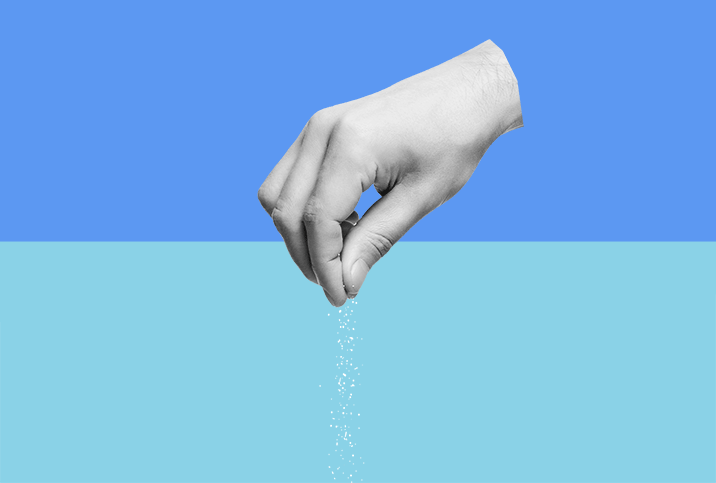How Salt Disrupts Your Immune Response

We've all heard by now about the dangers of consuming too much salt. High blood pressure, greater risk of stroke, heart failure and other cardiovascular issues often await those who are too generous with the salt shaker.
Sodium in the form of salt (sodium chloride) is a crucial electrolyte your body needs to function properly, and it has a variety of other functions we're still uncovering. However, the flavor enhancer that's been on our tables since before the pyramids were built seems to have gotten another strike against it in terms of health. A recent study published in the journal Circulation suggests too much salt may affect your immune system as well as your cardiovascular function.
The study, conducted by a team of researchers at the Max Delbrück Center for Molecular Medicine in Berlin, looked at how too much sodium affects energy production in your immune cells.
The implications include potentially disrupting immune function, causing your body to increase inflammatory response and subsequently contributing to autoimmune disease.
Tiny cells, big impact
In 2015, researchers discovered that high concentrations of salt in the blood affect the function of immune system cells called monocytes. These cells are the precursors to phagocytes, a type of immune cell responsible for identifying and destroying pathogens as well as infected cells and dead cells in the body.
Using mice and human monocytes, the researchers found that within three hours of exposure to high concentrations of sodium in the blood, the cells' mitochondria produced less energy in the form of adenosine triphosphate (ATP).
The mitochondria are the power center of these immune cells, and ATP is their crucial fuel for a whole host of bodily functions such as powering the muscles and regulating metabolism. The cells that were produced with a shortage of ATP showed an abnormal immune response, potentially leading to inflammation and increasing the risk of heart disease.
Our evolving understanding of salt's effects
As if too much salt disrupting your autoimmune response and causing inflammation weren't enough, how you season your food has many other ramifications as well.
The two most well-known health consequences related to overdoing sodium intake are, of course, high blood pressure and heart disease. But too much salt and even too little can also contribute to the development of stomach cancer and kidney stones in people with hypertension.
According to the American Heart Association, nine out of 10 Americans consume too much sodium—and not by a little. While the AHA recommends about 1, 500 milligrams of sodium per day, on average, Americans ingest around 3,400 milligrams from their food daily.
And the problem isn't just about being over-generous with how we use the salt shaker, either. According to the CDC, 65 percent of our sodium intake comes directly from the food we buy in stores. We get 25 percent from restaurants and just 10 percent from the salt we add at the table.
What's more, there's an excess of sodium not only in chips and other snacks, but also in seemingly innocuous foods such as bread and breakfast cereal.
From salt shaker to sexy times
For men in particular, this ocean of salt we're surrounded by can have serious quality-of-life consequences.
In addition to the immune issues outlined above, high blood pressure and cardiovascular disease aren't just abstract problems for guys. The real-world consequences include affecting how you perform in the bedroom as well. ED is now considered an early warning sign of heart disease, and high blood pressure is closely linked to poor erectile function.
The good news: A 2010 project from the University of San Juan, in Alicante, Spain, suggests that blood pressure treatment can improve erectile function in as little as six months. And improving your heart health can help your erectile function as well, as evidenced by a 2012 study published in the Journal of Sexual Medicine.
Conclusions
Getting your sodium intake under control is a great first step toward reining in high blood pressure and cardiovascular disease, and now research indicates that it can improve immune function as well. Take action by checking nutrition labels and being mindful of how often you reach for the shaker of salt.


















